
Position: Laboratory Technician
Employer: Laboratory Services Division, University of Guelph
Education: BSc (Biological Science), MSc (Environmental Biology)
How is soil science a part of your job?
I work at a plant pest diagnostic clinic, and one of my duties is to perform nematode extractions on soil samples and then identify and count the plant parasitic nematodes in the samples. Nematodes are a huge problem across the world, causing damage to crops we rely on like soy beans, cotton, root crops, and peanuts, to name a few. These nematodes dwell in the soil and then infect the plant roots. As such, we need to work with soil samples to figure out which genus of nematodes can be found in problem areas in order to find effective solutions. In a way, the soil holds the key to determining the problem with the crops!
How did you come to love soils?
Back in high school I was part of an extracurricular activity called Envirothon. This event involved field trips throughout the school year where we would learn about four different topics – wildlife, forestry, aquatic environments, and soils. My favourite activity days were those where we learned about soils. I discovered that soil science is a combination of many of my interests – biology, chemistry, the environment, geography – and that there was much to be learned about an ecosystem based on the soil. The more I learned, the more I realized how important soil is in the world – perhaps the most important resource on Earth! These discoveries encouraged me to pursue more education in the soil science field.
Why do you think it is important to study soil?
Soil is arguably the most important resource in the world. It is needed to grow our food and photosynthesizing plants and trees that provide us with oxygen. It filters and cleans water, and provides a foundation on which we build homes. It recycles nutrients and elements that are no longer used when organisms die, making them available for new life. Many people never stop to think about the importance of soil, and of how to conserve it. Without proper management practices, nutrients from soil are depleted and soil can be eroded. It can take years to foster healthy soil suitable for growing crops, but very little time to destroy it. We also need to think about soil biology and ensure that we are not harming the soil organisms responsible for many of the processes occurring in the soil. Soil is the medium that enables the environment’s most important cycles to happen – we need to learn about it in order to do our part to protect it so it may continue to keep our world alive.